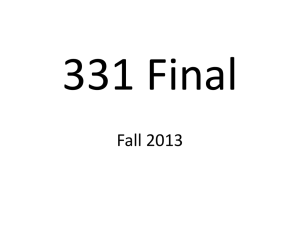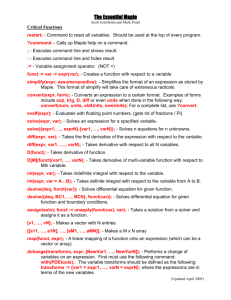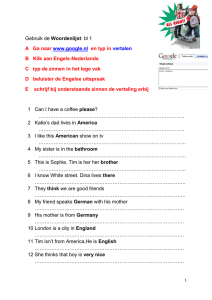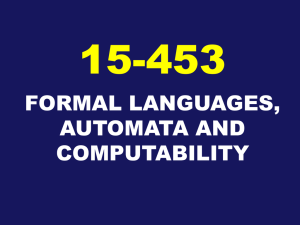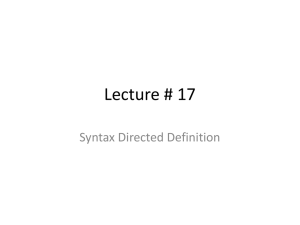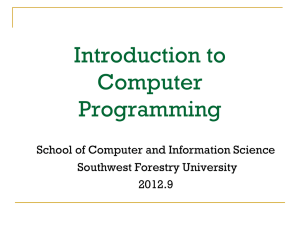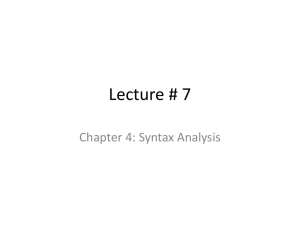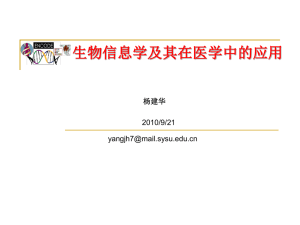assignment7
advertisement
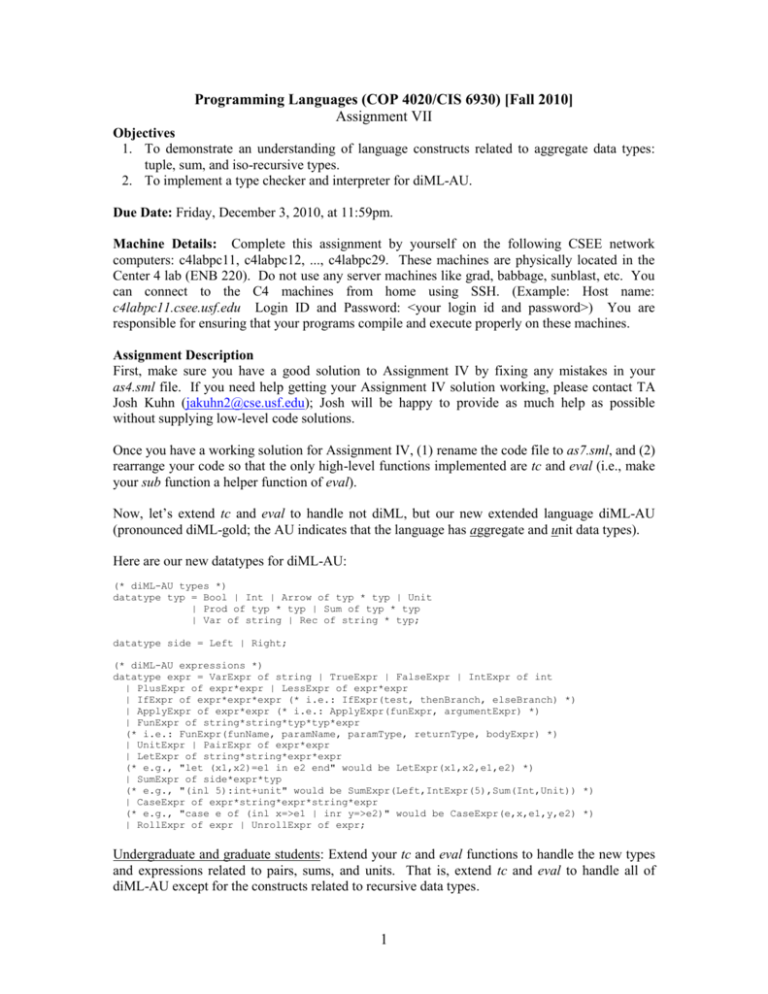
Programming Languages (COP 4020/CIS 6930) [Fall 2010] Assignment VII Objectives 1. To demonstrate an understanding of language constructs related to aggregate data types: tuple, sum, and iso-recursive types. 2. To implement a type checker and interpreter for diML-AU. Due Date: Friday, December 3, 2010, at 11:59pm. Machine Details: Complete this assignment by yourself on the following CSEE network computers: c4labpc11, c4labpc12, ..., c4labpc29. These machines are physically located in the Center 4 lab (ENB 220). Do not use any server machines like grad, babbage, sunblast, etc. You can connect to the C4 machines from home using SSH. (Example: Host name: c4labpc11.csee.usf.edu Login ID and Password: <your login id and password>) You are responsible for ensuring that your programs compile and execute properly on these machines. Assignment Description First, make sure you have a good solution to Assignment IV by fixing any mistakes in your as4.sml file. If you need help getting your Assignment IV solution working, please contact TA Josh Kuhn (jakuhn2@cse.usf.edu); Josh will be happy to provide as much help as possible without supplying low-level code solutions. Once you have a working solution for Assignment IV, (1) rename the code file to as7.sml, and (2) rearrange your code so that the only high-level functions implemented are tc and eval (i.e., make your sub function a helper function of eval). Now, let’s extend tc and eval to handle not diML, but our new extended language diML-AU (pronounced diML-gold; the AU indicates that the language has aggregate and unit data types). Here are our new datatypes for diML-AU: (* diML-AU types *) datatype typ = Bool | Int | Arrow of typ * typ | Unit | Prod of typ * typ | Sum of typ * typ | Var of string | Rec of string * typ; datatype side = Left | Right; (* diML-AU expressions *) datatype expr = VarExpr of string | TrueExpr | FalseExpr | IntExpr of int | PlusExpr of expr*expr | LessExpr of expr*expr | IfExpr of expr*expr*expr (* i.e.: IfExpr(test, thenBranch, elseBranch) *) | ApplyExpr of expr*expr (* i.e.: ApplyExpr(funExpr, argumentExpr) *) | FunExpr of string*string*typ*typ*expr (* i.e.: FunExpr(funName, paramName, paramType, returnType, bodyExpr) *) | UnitExpr | PairExpr of expr*expr | LetExpr of string*string*expr*expr (* e.g., "let (x1,x2)=e1 in e2 end" would be LetExpr(x1,x2,e1,e2) *) | SumExpr of side*expr*typ (* e.g., "(inl 5):int+unit" would be SumExpr(Left,IntExpr(5),Sum(Int,Unit)) *) | CaseExpr of expr*string*expr*string*expr (* e.g., "case e of (inl x=>e1 | inr y=>e2)" would be CaseExpr(e,x,e1,y,e2) *) | RollExpr of expr | UnrollExpr of expr; Undergraduate and graduate students: Extend your tc and eval functions to handle the new types and expressions related to pairs, sums, and units. That is, extend tc and eval to handle all of diML-AU except for the constructs related to recursive data types. 1 Graduate students and undergraduates who want up to +20% extra credit: Also extend tc and eval to handle the constructs related to recursive data types (i.e., the types Var and Rec and the expressions RollExpr and UnrollExpr). All students: In addition to extending your tc and eval functions, also test them thoroughly. Include in your as7.sml file at least 5 good test expressions; try to test complex corner cases of your type checker and evaluator. Throughout this assignment, you may assume that all value-variable names in expressions being type checked and evaluated are unique. Hints: My extended tc and eval functions are 179 lines of code in total (not counting comments and whitespace). It took me about 8 hours to implement and test the extended versions of these functions, including the time needed to create several test expressions. These line and hour counts include handling recursive data types. The file at http://www.cse.usf.edu/~ligatti/pl-10/as7/exprs7.sml defines 6 diML-AU expressions, which may help you test your tc and eval functions. The first three expressions in exprs7.sml can be used to test nonrecursive aggregate data types, while the last three expressions in exprs7.sml can be used to test recursive aggregate data types. Sample Executions > sml Standard ML of New Jersey v110.67 [built: Mon Aug 11 10:54:32 2008] - use "as7.sml"; [opening as7.sml] datatype typ = Arrow of typ * typ | Bool | Int | Prod of typ * typ | Rec of string * typ | Sum of typ * typ | Unit | Var of string datatype side = Left | Right datatype expr = ApplyExpr of expr * expr | CaseExpr of expr * string * expr * string * expr | FalseExpr | FunExpr of string * string * typ * typ * expr | IfExpr of expr * expr * expr | IntExpr of int | LessExpr of expr * expr | LetExpr of string * string * expr * expr | PairExpr of expr * expr | PlusExpr of expr * expr | RollExpr of expr | SumExpr of side * expr * typ | TrueExpr | UnitExpr | UnrollExpr of expr | VarExpr of string val tc = fn : expr -> typ option exception stuck val eval = fn : expr -> expr val it = () : unit - use "exprs7.sml"; [opening exprs7.sml] ... - tc e1; val it = SOME (Arrow (Sum (Unit,Prod (Int,Int)),Sum (Prod (Int,Int),Unit))) 2 : typ option - tc e2; val it = SOME (Sum (Unit,Prod (Int,Int))) : typ option - tc e3; val it = SOME Int : typ option - tc e4; val it = SOME (Arrow (Rec ("t",Sum (Unit,Prod (Int,Var "t"))), Rec ("t",Sum (Unit,Prod (Int,Var "t"))))) : typ option - tc e5; val it = SOME (Rec ("t'",Sum (Unit,Prod (Int,Var "t'")))) : typ option - tc e6; val it = SOME (Rec ("t",Sum (Unit,Prod (Int,Var "t")))) : typ option - eval e3; val it = IntExpr 5 : expr - eval e5; (* this is the list 2::3::4::nil *) val it = RollExpr (SumExpr (Right, PairExpr (IntExpr 2, RollExpr (SumExpr (Right, PairExpr (IntExpr 3, RollExpr (SumExpr (Right, PairExpr (IntExpr 4, RollExpr (SumExpr (Left,UnitExpr, Sum (Unit, Prod (Int, Rec ("t",Sum (Unit,Prod (Int,Var "t")))))))), Sum (Unit, Prod (Int,Rec ("t",Sum (Unit,Prod (Int,Var "t")))))))), Sum (Unit,Prod (Int,Rec ("t",Sum (Unit,Prod (Int,Var "t")))))))), Sum (Unit,Prod (Int,Rec ("t",Sum (Unit,Prod (Int,Var "t"))))))) : expr - eval e6; (* this should reverse e5, to produce 4::3::2::nil *) val it = RollExpr (SumExpr (Right, PairExpr (IntExpr 4, RollExpr (SumExpr (Right, PairExpr (IntExpr 3, RollExpr (SumExpr (Right, PairExpr (IntExpr 2, RollExpr (SumExpr (Left,UnitExpr, Sum (Unit, 3 Prod (Int, Rec ("t",Sum (Unit,Prod (Int,Var "t")))))))), Sum (Unit, Prod (Int,Rec ("t",Sum (Unit,Prod (Int,Var "t")))))))), Sum (Unit,Prod (Int,Rec ("t",Sum (Unit,Prod (Int,Var "t")))))))), Sum (Unit,Prod (Int,Rec ("t",Sum (Unit,Prod (Int,Var "t"))))))) : expr Grading For full credit, your implementation must: be commented and formatted appropriately. use ML features like pattern matching when appropriate. compile on the C4 machines with no errors or warnings. not use any ML features that cause side effects to occur (e.g., I/O or references/pointers). not be significantly more complicated than is necessary. Please note that we will test submissions on inputs not shown in the sample executions above. Submission Notes Type the following pledge as an initial comment in your as7.sml file: “I pledge my Honor that I have not cheated, and will not cheat, on this assignment.” Type your name after the pledge. Not including this pledge will lower your grade 50%. Upload and submit your as7.sml file in Blackboard. You may submit your assignment in Blackboard as many times as you like; we will grade your latest submission. For every day that your assignment is late (up to 3 days), your grade reduces 10%. 4
